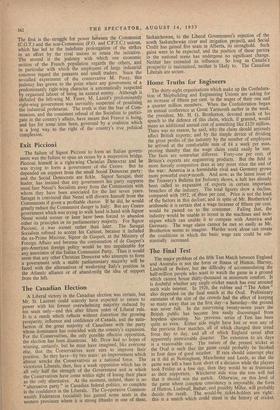The Canadian Election
A Liberal victory in the Canadian election was certain, but Mr. St. Laurent could scarcely have expected to return to power with his former overwhelming majority reduced by ten seats only—and this after fifteen years of Liberal rule. It is a result which reflects without distortion the growing prosperity, influence and confidence of Canada, and the satis- faction of the great majority of Canadians with the party whose dominance has coincided with the country's expansion. For the Conservatives, the only possible effective opposition, the election has been disastrous. Mr. Drew had no hopes of winning, certainly, but he must have imagined, like everyone else, that the. Conservatives were sure to improve their position. So they have—by two seats: an improvement which almost wrecks the Conservatives as a national force. The victorious Liberals, then, face a weak opposition which has in all only half the strength of the Government and in which the Conservatives have come within sight of losing their place as the only alternative. At the moment, indeed, there is no " alternative party " in Canadian federal politics, so complete is the confidence in the Liberals. The Co-operative Common- wealth Federation (socialist) has gained some seats in the western provinces where it is strong (thanks in one of these, Saskatchewan, to the Liberal Government's rejection of the south Saskatchewan river and irrigation project), and Social Credit has gained five seats in Alberta, its stronghold. Such gains were to be expected, and the position of these parties in the national scene has undergone no significant change. Neither has extended its influence. So long as Canada's prosperity is maintained, neither is likely to. The Canadian Liberals are secure.


































 Previous page
Previous page